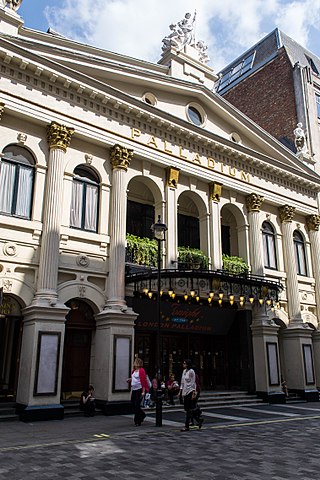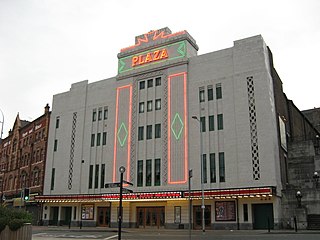
The London Palladium is a Grade II* West End theatre located on Argyll Street, London, in Soho. The auditorium holds 2,286 people. Hundreds of stars have played there, many with televised performances. Between 1955 and 1969 Sunday Night at the London Palladium was staged at the venue, produced for the ITV network. The show included a performance by the Beatles on 13 October 1963. One national paper's headlines in the following days coined the term "Beatlemania" to describe the increasingly hysterical interest in the band.

Stockton-on-Tees is a market town in County Durham, England, with a population of 84,815 at the 2021 UK census. It gives its name to and is the largest settlement in the wider Borough of Stockton-on-Tees. It is part of Teesside and the Tees Valley, on the northern bank of the River Tees.

The Royal Court Theatre is a theatre located at 1 Roe Street in Liverpool, England. The current Royal Court Theatre was opened on 17 October 1938, after fire destroyed its predecessor. It was rebuilt in Art Deco style and soon became Liverpool's premier theatre. The interior of the building has a nautical theme, in line with Liverpool's seafaring traditions. The design of the basement lounge was based on the Cunard liner Queen Mary until its conversion into the Studio space during renovations. There are three viewing levels within the main auditorium: the Stalls, the Grand Circle and the Balcony.

The Sunderland Empire Theatre is a large theatre venue located in High Street West in Sunderland, North East England. The theatre, which opened in 1907, is owned by City of Sunderland Council and operated by Ambassador Theatre Group Ltd, on behalf of Sunderland Empire Theatre Trust.

Buxton Opera House is in The Square, Buxton, Derbyshire, England. It is a 902-seat opera house that hosts the annual Buxton Festival and the International Gilbert and Sullivan Festival, among others, as well as pantomime at Christmas, musicals and other entertainments year-round. Hosting live performances until 1927, the theatre then was used mostly as a cinema until 1976. In 1979, it was refurbished and reopened as a venue for live performance.

The Birmingham Hippodrome is a theatre situated on Hurst Street in the Chinese Quarter of Birmingham, England.

The Lyceum Theatre is a West End theatre located in the City of Westminster, on Wellington Street, just off the Strand in central London. It has a seating capacity of 2,100. The origins of the theatre date to 1765. Managed by Samuel Arnold, from 1794 to 1809 the building hosted a variety of entertainments including a circus produced by Philip Astley, a chapel, and the first London exhibition of waxworks by Madame Tussauds. From 1816 to 1830, it served as The English Opera House. After a fire, the house was rebuilt and reopened on 14 July 1834 to a design by Samuel Beazley. The building is unique in that it has a balcony overhanging the dress circle. It was built by the partnership of Peto & Grissell. The theatre then played opera, adaptations of Charles Dickens novels and James Planché's "fairy extravaganzas", among other works.

The Regent Theatre is a theatre in Stoke-on-Trent, England. Constructed in 1929 as a cinema, it is one of several theatres in the city centre and one of two operated by the Ambassador Theatre Group on behalf of Stoke-on-Trent City Council. The building was converted for full-time use as a theatre in 1999, and since then has hosted a number of shows and musicals. The theatre is also the northern base for the Glyndebourne Touring Opera.

Victoria Theatre in Halifax, West Yorkshire, England, is a large theatre and concert hall that opened in 1901.

York Theatre Royal is a theatre in St Leonard's Place, in York, England, which dates back to 1744. The theatre currently seats 750 people. Whilst the theatre is traditionally a proscenium theatre, it was reconfigured for a season in 2011 to offer productions in-the-round. The theatre puts on many of its own productions, as well as hosting touring companies, one of which is Pilot Theatre, a national touring company which often co-produces its work with the theatre. Additionally the main stage and studio are regularly used by local amateur dramatic and operatic societies. York Theatre Royal was one of the co-producers of the historic York Mystery Plays 2012 which were staged in York Museum Gardens between 2–27 August. The theatre reopened on Friday 22 April 2016 following a £6million redevelopment, with a new roof, an extended and re-modelled front of house area, a refurbished and redecorated main auditorium and with major improvements to access and environmental impact.

Avalon is a historic nightclub in Hollywood, California, located near the intersection of Hollywood and Vine, at 1735 N. Vine Street. It has previously been known as The Hollywood Playhouse, The WPA Federal Theatre, El Capitan Theatre, The Jerry Lewis Theatre, The Hollywood Palace and The Palace. It has a capacity of 1,500, and is located across the street from the Capitol Records Building.

The King's Theatre is a theatre in Edinburgh, Scotland.

The Apollo Victoria Theatre is a West End theatre on Wilton Road in the Westminster district of London, across from London Victoria Station. Opened in 1930 as a cinema and variety theatre, the Apollo Victoria became a venue for musical theatre, beginning with The Sound of Music in 1981, and including the long-running Starlight Express, from 1984 to 2002. The theatre is currently the home of the musical Wicked, which has played at the venue since 27 September 2006.

The Plaza is a Grade II* listed art deco single-screen cinema and theatre in Stockport, Greater Manchester, England. It opened in 1932, its construction having involved the excavation of the sandstone cliff behind it. After an initial closure in 1966 and a subsequent period in use as a bingo hall by Rank Leiure, it has now been restored as a cinema and theatre, showing films and staging live shows.

The Syndicate was a superclub and music venue in Blackpool, Lancashire, England. It was the largest nightclub in North West England, and claimed to be the largest nightclub in the United Kingdom. The club opened in December 2002 and had at the time of closing, three levels of floor space, three segmented rooms, and a VIP floor. It had a capacity of 5,000 if including the club 'status', which was part of the building but was advertised as a second nightclub in the earlier years. Otherwise, the capacity was 4,500, with a 2,200 capacity in the downstairs section, and a 2,300 capacity in the higher levels. The higher floors were tiered, with the VIP section being at the top of the tier overlooking a balcony section below which itself overlooked the dancefloor. The dance floor area had a revolving dance floor in the middle of it. This whole upper section of floors was a single open space and was named the 'Dance Arena'.

The Marina is a theatre and cinema in Lowestoft, Suffolk, originally opened in the Victorian era. The venue has an auditorium seating 800. It plays host to major West End productions, top comedy, orchestral concerts, touring drama and musical productions, opera, ballet, music, dance and celebrity concerts as well as operating a successful cinema operation - boasting the largest screen and cinema auditoria in the town. The Marina annually hosts the largest professional pantomime on the East Anglian Coast.

Royal & Derngate is a theatre complex in the Cultural Quarter of Northampton, England, consisting of the Royal Theatre, Derngate Theatre and the Northampton Filmhouse. The Royal was built by theatre architect Charles J. Phipps and opened in 1884. Ninety-nine years later in 1983, Derngate, designed by RHWL, was built to the rear of the Royal. Whilst the two theatres were physically linked, they did not combine organisations until a formal merger in 1999; they are run by the Northampton Theatres Trust. The Royal Theatre, established as a producing house, has a capacity of 450 seats and since 1976 has been designated a Grade II listed building; Derngate Theatre seats a maximum of 1,200 and is a multi-purpose space in which the auditorium can be configured for a variety of events including theatre, opera, live music, dance, fashion and sports. The Northampton Filmhouse, an independent cinema built to the side of the complex, opened in 2013.

ARC Theatre & Arts Centre is an organisation working from the ARC Theatre & Arts Centre in Stockton-on-Tees, County Durham. The organisation provides arts-based education and entertainment through partnership with other organisations.
The Theatre Royal, Hanley was a theatre in Stoke-on-Trent, England with a long history.

The Deco is a restored 1930s cinema and theatre located in the heart of Northampton, England. It is now operated as a venue for corporate, social and theatrical events.























